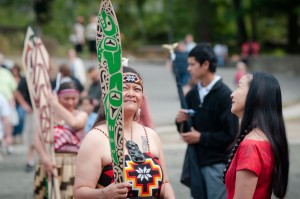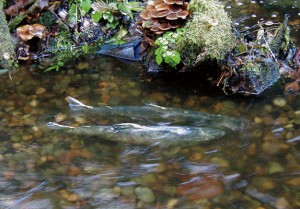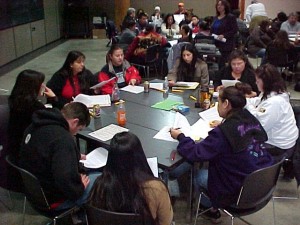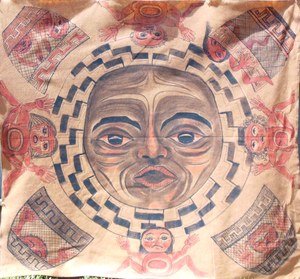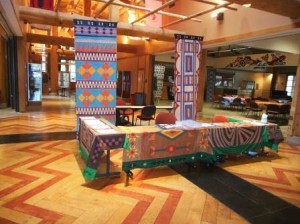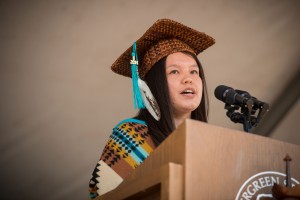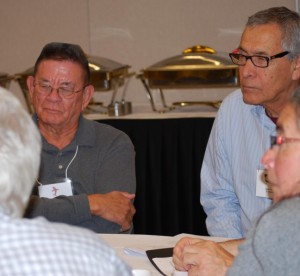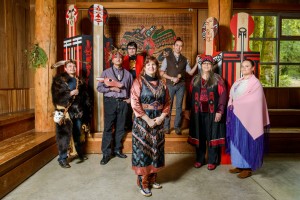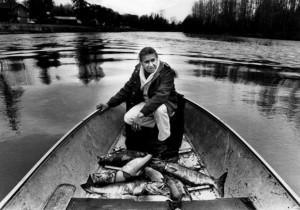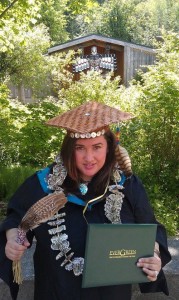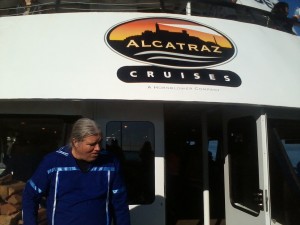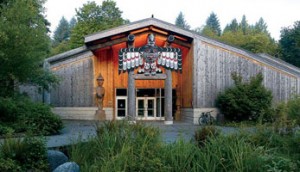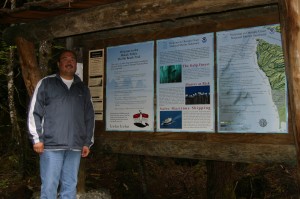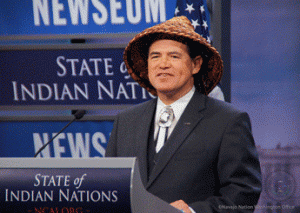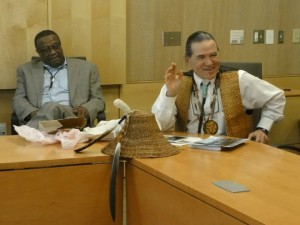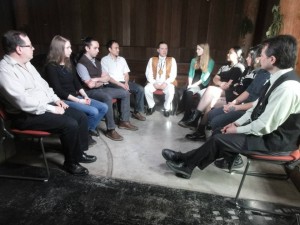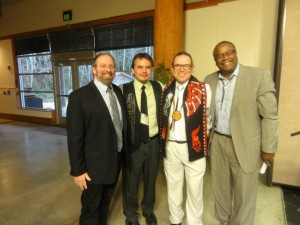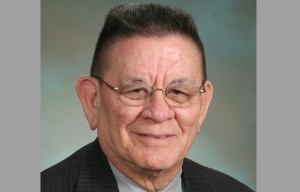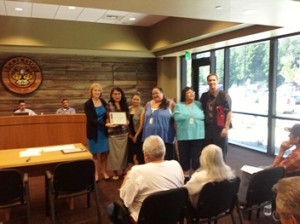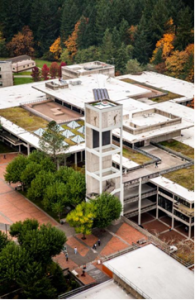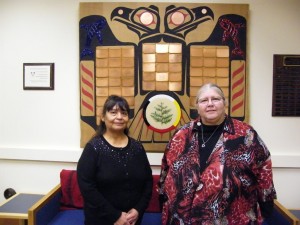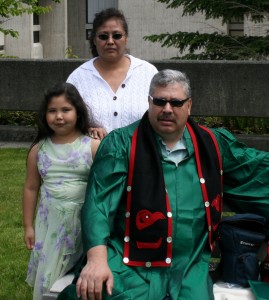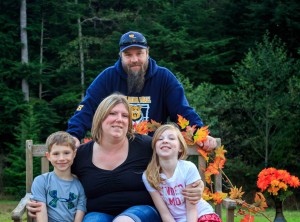Welcome to the Tribal Newsletter Page. We hope to capture a picture of the many programs that Evergreen supports in its Rivers of Knowledge programming. A brief version, in hard copy, is available quarterly (minus summer) at various locations on campus or by contacting the MPA Tribal Governance concentration.
For more campus and Native news, please visit: www.evergreen.edu/nativeprograms and www.ravenredbone.wordpress.com
Please visit this beautiful website to learn more about the 2015 Enduring Spirit Award from the Native Action Network that Evergreen Faculty, Yvonne Peterson was honored to receive.
Brit Reed, MPA 2016 Candidate- Tribal Governance Cohort is Publishing!
Brit already has one article published with Last Real Indian. She is expected to publish a three part series on the on the Indian Child Welfare Act of 1978 . Look for more about Brit on our student profile page.
Longhouse News
The Longhouse is partnering with the Squaxin Island Tribe to host the Salish Sea Native Arts Celebration on Saturday, June 27th from 10 am to 5 pm. The event will feature Native artists, drum and dance groups, Coast Salish canoes and Native foods. The event will take place at the Port of Olympia’s Swantown Marina. If you would like to volunteer for this fun, free, family event, please contact Erin Genia at geniae@evergreen.edu.
For more information: http://www.evergreen.edu/longhouse/images/ASalish_Sea_Art-Celebration-8.5×11.jpg
Hope to see you there! Tina
Roxanne Dunbar-Ortizspeaks in Olympia on May 4 and 5 about her new book An Indigenous Peoples’ History of the United States
Native American feminist scholar and activist Roxanne Dunbar-Ortiz will be speaking in Olympia on Monday, May 4, and Tuesday, May 5, about her new Beacon Press book An Indigenous Peoples’ History of the United States. She will be speaking at Olympia Timberland Library on Monday, May 4, at 6:30-7:45 pm, and at the Evergreen Longhouse on Tuesday, May 5, at 7:00-9:00 pm. The events are free and open to the public. Download and print the poster for the May 5 Evergreen event:
http://academic.evergreen.edu/g/grossmaz/RoxannePoster.pdf
The publisher describes the book: “Today, in the United States, there are more than five hundred federally recognized indigenous communities and nations comprising nearly three million people. These individuals are the descendants of the once fifteen million people who inhabited this land and are the subject of the latest book by noted historian and activist Roxanne Dunbar-Ortiz. In An Indigenous Peoples’ History of the United States, Dunbar-Ortiz challenges the founding myth of the United States and shows how policy against the indigenous peoples was genocidal and imperialist–designed to crush the original inhabitants. Spanning more than three hundred years, this classic bottom-up history significantly reframes how we view our past. Told from the viewpoint of the indigenous, it reveals how Native Americans, for centuries, actively resisted expansion of the U.S. empire.”
“An Indigenous Peoples’ History of the United States provides an essential historical reference for all Americans. . . . The American Indians’ perspective has been absent from colonial histories for too long, leaving continued misunderstandings of our struggles for sovereignty and human rights.”
—Peterson Zah, former president of the Navajo Nation
“Roxanne Dunbar-Ortiz writes a masterful story that relates what the Indigenous peoples of the United States have always maintained: Against the settler U.S. nation, Indigenous peoples have persevered against actions and policies intended to exterminate them, whether physically, mentally, or intellectually. Indigenous nations and their people continue to bear witness to their experiences under the U.S. and demand justice as well as the realization of sovereignty on their own terms.”
–Jennifer Nez Denetdale, Associate Professor of American Studies at the University of New Mexico and author of Reclaiming Diné History
“An Indigenous Peoples’ History …pulls up the paving stones and lays bare the deep history of the United States, from the corn to the reservations. If the United States is a ‘crime scene,’ as she calls it, then Dunbar-Ortiz is its forensic scientist. A sobering look at a grave history.”
—Vijay Prashad, author of The Poorer Nations
“Justice-seekers everywhere will celebrate Dunbar-Ortiz’s unflinching commitment to truth—a truth that places settler-colonialism and genocide exactly where they belong: as foundational to the existence of the United States.”
—Waziyatawin, PhD, activist and author of For Indigenous Minds Only
More background on the book at http://www.beacon.org/An-Indigenous-Peoples-History-of-the-United-States-P1041.aspx
About Roxanne Dunbar-Ortiz Roxanne Dunbar-Ortiz grew up in rural Oklahoma, daughter of a landless farmer and half-Indian mother. Her paternal grandfather, a white settler, farmer, and veterinarian, had been a labor activist and Socialist in Oklahoma with the Industrial Workers of the World in the first two decades of the twentieth century. The stories of her grandfather inspired her to lifelong social justice activism. Married at eighteen, she left with her husband for San Francisco, California, where she has lived most of the years since, although the marriage ended. Her account of life up to leaving Oklahoma is recorded in Red Dirt: Growing Up Okie. She has a daughter, Michelle.
Roxanne graduated, majoring in History, from San Francisco State College, a working class public institution, but was selected for History graduate school at University of California at Berkeley, transferring to University of California, Los Angeles to complete her doctorate in History. From 1967 to 1972, she was a full time activist living in various parts of the United States, traveling to Europe, Mexico, and Cuba. This time of her life and the aftermath, 1960-1975, is the story told in Outlaw Woman: Memoir of the War Years.
Roxanne took a position teaching in a newly established Native American Studies program at California State University at Hayward, near San Francisco, and helped develop the Department of Ethnic Studies, as well as Women’s Studies. In 1974, she became active in the American Indian Movement (AIM) and the International Indian Treaty Council, beginning a lifelong commitment to international human rights.
Her first published book, The Great Sioux Nation: An Oral History of the Sioux Nation and its Struggle for Sovereignty, was published in 1977 and was presented as the fundamental document at the first international conference on Indians of the Americas, held at United Nations’ headquarters in Geneva, Switzerland. That book was followed by two others in the following years: Roots of Resistance: A History of Land Tenure in New Mexico, 1680-1980 and Indians of the Americas: Human Rights and Self-Determination. In over a hundred trips to Nicaragua and Honduras from 1981 to 1989, she monitored what was called the Contra War. Her book, Blood on the Border: A Memoir of the Contra War was published in 2005.
More background on the author at http://www.reddirtsite.com
Sponsors Roxanne Dunbar-Ortiz’s visit is sponsored by the Evergreen program “Native Decolonization in the Pacific Rim: From the Northwest to New Zealand,” in collaboration with the TESC President’s Diversity Fund, Longhouse Education and Cultural Center, Native Programs at Evergreen, Olympia Timberland Library, Friends of the Library, Center for Community-Based Learning and Action, TESC Tacoma, & TESC programs “Current Economic & Social Issues,” “Reflecting on Activism,” and “Branching Out: Ethnobotanical Gardens.”For background on Native Programs at Evergreen: http://www.evergreen.edu/nativeprograms
DirectionsThe Olympia Timberland Library is located at 313 8th Ave SE. The Evergreen State College is located at 2700 Evergreen Parkway NW (the closest parking will be in the B Lot; turn to the left as you drive into campus, and walk the footpath to the Longhouse).
|
|
Enduring Legacies Native Cases Summer Institute
The Evergreen State College
Thursday-Friday June 25-26, 2015 at Little Creek Resort Hotel
Squaxin Island Tribe
The Summer Institute of the Enduring Legacies Native Cases Initiative will build on ten years of work developing teaching interdisciplinary case studies on significant issues in Indian Country and offering workshops for educators to network and learn how to use the cases in their classes. Our interdisciplinary collection of cases covers a wide range of topics applicable to all academic fields. Problem-based learning, place-based learning and collaborative learning are the cornerstones of our approach. Cases promote student engagement and critical thinking in the context of complex and pressing real world issues. They are a terrific way of promoting diversity. At this institute, we will practice working through cases collaboratively to learn how to facilitate case analysis and discussion.
Summer institute particulars: The summer institute will run from 8:00 a.m. to 5:00 p.m. each day. Breakfast is at 8 a. m. with the program starting at 9 a.m. Pre-reading and homework are required each evening. Campuses are invited to bring teams or attend the institute as individuals. Space is limited and registration is first come, first served so register early. The registration fee for the two-day institute is $75/person which includes breakfast and lunch each day. Hotel rooms are available at the rate of $77.00 per night with a cut-off date for reservations at this rate of May 25. Contact Little Creek Resort Hotel directly at toll-free 1-888-670-1158 to reserve rooms and say you are with the Native Cases Institute.
For more information about Native Cases Project and Conference, contact Barbara Leigh Smith 360.765.3084 or smithb@evergreen.edu www.nativecases.evergeeen.edu
Photo to the left: Students in Evergreen’s Reservation-Based program are discussing a case in small groups and then reporting out. Native cases are now an essential part of our curriculum. The cases are being used by over 100 other colleges and universities as well.Doe Stahr creates Native American style pottery and world-tribal style painted felt textiles for event décor. Article courtesy of Doe Stahr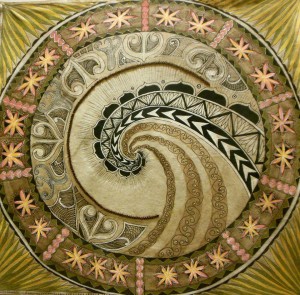 The Wave of Life, Hawaiian style, felt with acrylic and mixed media. 2014Doe moved to the northwest in 1986 after a career in commercial interior design in Miami, Florida. She began the work in pottery in 1989, then with textiles in 2005. Neither medium had been widely adopted by the Northwest tribes before that time. The ebb and flow of totemic form-line figures spoke to her with their rich complexity and deep spiritual meaning. Basketry designs are a natural for adapting to pottery and larger scale textiles.Doe lived with culture bearer, Bob Sam for seven years in Sitka, Alaska, and since 2000, raised their half-Tlingit daughter in the urban multi-tribal communities of Seattle and Western Washington.Doe has navigated the complex politics of working behind cultural lines in Indian Country for 28 years. She is forthright about her lineage and familial relationship to the Tlingit people. She observes cultural protocol and respects the rule of law about the Indian Art Act. She serves the inter-tribal community events with her functional, regalia quality textiles that uphold the beauty of rich ancient cultures. The Wave of Life, Hawaiian style, felt with acrylic and mixed media. 2014Doe moved to the northwest in 1986 after a career in commercial interior design in Miami, Florida. She began the work in pottery in 1989, then with textiles in 2005. Neither medium had been widely adopted by the Northwest tribes before that time. The ebb and flow of totemic form-line figures spoke to her with their rich complexity and deep spiritual meaning. Basketry designs are a natural for adapting to pottery and larger scale textiles.Doe lived with culture bearer, Bob Sam for seven years in Sitka, Alaska, and since 2000, raised their half-Tlingit daughter in the urban multi-tribal communities of Seattle and Western Washington.Doe has navigated the complex politics of working behind cultural lines in Indian Country for 28 years. She is forthright about her lineage and familial relationship to the Tlingit people. She observes cultural protocol and respects the rule of law about the Indian Art Act. She serves the inter-tribal community events with her functional, regalia quality textiles that uphold the beauty of rich ancient cultures.
Escaping from Wild Woman of the Woods 2014 In her Deer Creek Studio, her first art installation series of 2015, Doe Stahr’s work and research led her from coast to coast and very deep into history of the art of American Indigenous tribal people. Rather than focus on only thirty tribes out of the hundreds, she chose to feature designs that showed design characteristics in certain mediums and techniques shared by many tribes. “I included designs to honor the traditions of carving,(canoes, paddles and waves), micro fabric piecework of the Seminole, rawhide painting of the northern Plains, the Floral Beading of the Eastern Woodlands, and full coverage beading of the Southern plains, and bead weaving with wampum shell, painted pottery, and textile weaving with mountain sheep wool. I do appropriate design elements as correctly as I can, not to take them from the culture, but to bring them to the places where the people gather: to heal, celebrate and grow together.” Ode to Canoe Journey: Returning by Moon and Starlight. 2015 Felt, Acrylic and mixed media West Coast and interior basketry designs and both Puget Salish and northern style form line designs are represented in the smaller pieces of the series, intended for tabletops. All of these painted with mixed media panels are correct in the small details, and new in overall compositions. She created this body of work to serve as an honoring and unifying influence at multi tribal events. The concept had its inception from the Tlingit tradition of house screen paintings that are architectural scale. Banner series are 10 so far, and Table covers number well over 100. Doe leads workshops with native education programs at every opportunity. She rents art textile installations: UW, UWT, Green River, The Evergreen State College, Western Washington U, EVCC. She serves Native Education inter-tribal conferences and cultural galas in Washington and Oregon and beyond. Micah McCarty brought them to the First Stewards conference in Washington DC, a gathering of tribal leaders from around the Pacific Rim. Her artwork serves to make neutral meeting rooms more culturally welcoming for native and world cultures arts themed events, with painted textile installations that take cultural iconography to the architectural scale on tabletops, banners, and stage dressing. Evergreen Longhouse entrance tables: for the Future Native Teachers Initiative conference. Seminole, Cheyanne, Arapaho, Tlingit, Tahonna O’odham, and Micmac designs. All 2015 Doe Stahr. T’saawkaawk, Dakleweidee clan, Killerwhale, adopted 1996, Haines Alaska. www.deer-creek-studio.com doestahr@raincity.com 425-577-0462 cell, FB and Linked In. |

Honoring and ceremony at the 25th Annual Centennial Accord Commemoration
Lexie Tom, Lummi, The Evergreen State College Graduate Student Speaker 2014
Congratulations to all of the MPA Graduates. The ceremony in the longhouse was beautiful and meaningful. We thank all of our speakers for their touching and inspirational messages. Though we will miss your presence on campus, we can not wait to see the good you do in your futures.
Native Cases Project Summer 2014 Workshop
Participants discuss cases in small groups. (Left, Rep. John McCoy and Alan Parker)
The 10th annual Native Cases Institute will be held at the Tulalip Resort Hotel August 24-26. The institute attracts a broad audience of college and high school teachers as well as others working on behalf of Indian people in tribes, state agencies and the legislature. At this Institute keynote speakers Senator John McCoy, Sam Deloria and Vivian Arviso will discuss emerging issues in Indian Country. Fifty people are expected to attend the Native Cases institute which is funded through generous grants from the Tulalip Tribes and the San Manuel Band of Mission Indians.
Cases discussed focused on many different issues— climate change and intergovernmental negotiations , two spirit people, bullying and discrimination in schools, Indian identity and funding in the arts, the impact of mining in Alaska, Indian mascots, domestic violence, salmon restoration and the culvert case, and the Quileute and Twilight. Many of the cases in the collection focus on contemporary issues in the Pacific Northwest.
Visit the Native Cases website at www.nativecases.evergreen.edu to access the Native cases and teaching notes and to find information about other resources and future workshops.
Greeners at Washington Indian Education Conference in Spokane
Micah McCarty (Makah), Special Assistant to the President for Tribal Relations at Evergreen), Cindy Marchand Cecil (Director Reservation Based Program) and Barbara Leigh Smith (Director Native Cases Initiative) attended the Washington Indian Education Association’s annual conference in Spokane in early April.
McCarty gave one of the keynote addresses. Micah said Washington tribes are in the process of “repatriating our sovereignty.” He stressed the resilience of Native nations and the importance of stories and “keeping the living breath of our ancestors alive.” Marchand-Cecil and Smith did a workshop on Evergreen’s Enduring Legacies Native Cases Project.
Thank you Longhouse Staff
If you haven’t participated in the many activities offered through the Native Programming and Longhouse, visit these folks!
- “House of Welcome” Longhouse Education and Cultural Center
- First Peoples’ Advising at Evergreen
- Master of Public Administration in Tribal Governance, (which began in 2002)
- Native American and World Indigenous Peoples Studies (on-campus undergraduate)
- Reservation Based Community Determined Program (undergraduate)
Together these programs enable the college to continue and expand upon its history of responding in partnership to the educational needs of indigenous peoples.
Memorial for Billy Frank Jr Sees Thousands of Visitors
DONATIONS are being accepted by the Northwest Indian Fisheries Commission for the Billy Frank Services Fund. Send donations to the NWIFC, 6730 Martin Way E., Olympia, Wash. 98516. http://www.nwifc.org Donations can also be made to the Billy Frank Jr. Salmon Forever Fund in care of Salmon Defense, PO Box 7431, Olympia, Wash. http://salmondefense.org/salmon-forever-fund/ ”
BACKGROUND:
The Life and Legacy of Billy Frank, Jr.
(you can add memories here):
http://billyfrankjr.org/
Obituary in the Olympian:
http://www.theolympian.com/2014/05/06/3118975/tribal-fishing-activist-led-fight.html
As Long as the Rivers Run
(1971 documentary by the late Carol Burns):
View 1-hour film at https://archive.org/details/AsLongAsTheRiversRun
Where the Salmon Run: The Life and Legacy of Billy Frank, Jr.
(by Trova Heffernan, Washington State Heritage Center Legacy Project, 2012)
http://www.sos.wa.gov/legacyproject/oralhistories/BillyFrankJr/
PDF text at http://www.sos.wa.gov/legacyproject/oralhistories/BillyFrankJr/pdf/complete.pdf
Messages from Frank’s Landing: A Story of Salmon, Treaties, and the Indian Way
(by Charles Wilkinson, University of Washington Press, 2000)
https://www.washington.edu/uwpress/search/books/WILMES.html
Statement by President Obama
http://www.whitehouse.gov/the-press-office/2014/05/05/statement-president-passing-billy-frank-jr
Kendra Aguilar, Luiseno, MPA 2012
From RBCD to PHD, Kendra is building her education. After graduating from the Reservation Based Community Determined Program at Evergreen, Kendra completed her Masters of Administration with the Tribal Governance Concentration in 2012. She is currently enrolled as part of the first ever cohort of U.S. Tribal students to pursue their Doctorate in Indigenous Development and Advancement (IDA) through Te Whare Wananga O Awanuiarangi, an Indigenous-Maori University based in New Zealand.
Kendra stated, “As a student of Evergreen’s Reservation Based Community Determined Program (RBCDP) I was encouraged and inspired to actively take part in making a difference in my community. After building the foundation for a Native nonprofit with a fellow RBCDP student, we knew we would benefit from the top-rated MPA program Evergreen had to offer. Although some would have thought it more prudent to choose the Nonprofit concentration, the opportunity to learn from and along-side faculty and students with similar cultural values and a foundation of understanding of the complex history and current issues impacting Tribes and other Indigenous peoples made it the natural choice. It is the first MPA program to work directly with local Tribes to develop a curriculum suited for building a career in Tribal Governance or in serving Native communities. I had witnessed what other graduates of the Tribal cohort had done to benefit their peoples and was compelled to honor the sacrifices of my own ancestors by becoming a part of that legacy.”
When asked what take aways she has gained from the programs at Evergreen, Kendra eloquently said, “I’ve taken with me several great things from this program. It gave me the tools I need to succeed in any public service related field as well as a lifelong network of friends and colleagues who will continue to work together towards building a brighter future for our peoples. However, the greatest contribution this program has made to me in my career serving Native communities is the knowledge that together we can apply standard as well as our own traditional values and ways of knowing & learning to create a clear and proven pathway for Native student success.”
“I feel very passionately about the importance of having the opportunity to be part of a cohort of faculty and peers with a shared cultural perspective within an environment that mirrors many of our own traditional ways of learning. This allowed us to create a safe space for the sacred work we consider education to be, without having to explain ourselves or face the same hurtful ignorance we often do in all other aspects of our lives. Being Native means we are already full-time teachers, whether it is for our children or those who do not understand us. In other institutions I attended in the past, I felt I was paying tuition in order to teach those around me. Although I acknowledge that such an environment can have some benefits for all parties, having the Tribal cohort allowed us the rare opportunity to draw the focus away from having to teach others and instead focus on sharing our knowledge with each other. This Tribal cohort structure, which allowed for the strengthening of knowledge and relationships among Indigenous peoples, prepared me for the experience of learning across unique yet similar cultures with the Maori of New Zealand in my doctoral program.”
Kendra left fellow students with this advice, “The journey may be yours alone and at times you may face challenges, grow weary and doubt your ability, but remember; the spirits of those who came before you and those you have yet to touch are always with you. The success of one is the success of all and we are cheering you on.”
Good Luck to our future PHD, Kendra Aguilar!
Welcome New MPA Faculty Member Michael Lane
“The framework of tribal self governance must be viewed in the context of the values of the specific People to be a true expression of an Indigenous Nation exercising self government. This fundamental distinction can be traced back to the legal history. The foundational laws regarding interactions with Indigenous Peoples were developed under theories of natural law. The contemporary state practice is conducted under positivist law, with a nod toward developing human rights standards. Only through continued advocacy for the legal recognition of inherent rights will the nation-states be challenged on their self management agenda”.
– Michael Lane
Evergreen’s MPA Program extends an excited WELCOME to new faculty member, AND 1988 Evergreen Alumnus, Michael Lane, Menominee Nation and his family; Sharon Heta, who is Maori from Aotearoa, New Zealand, their three daughters, and their 18 month old grandson. Michael has been a “boots on the ground” advocate for Indigenous Peoples and self- governance for 36 years. Michael is currently obtaining his PhD, in Indigenous Studies with Trent University. He obtained his Masters in Indigenous Studies, with First Class Honors at Te Whare Wananga o Awanuiarangi, New Zealand. His thesis topic involved: Indigenous Peoples Self Government, Tribal Sovereignty, Early Treaty Making, Aboriginal Title/Discovery Doctrine, Legal History of Self Government (Canada, New Zealand, and United States). Michael also graduated from Arizona State University College of Law, in 1994 with a specialty in Federal Indian Law, Juris Doctor.
Michael has worked as a legal researcher, advocate and policy advisor, for over 20 years, with Springs From Earth Advocacy where he focused on representing various tribal interests in the United States, Canada and New Zealand (including resource development, prevention issues, environmental protection, environmental indicators, resource consents, representation and jurisdictional issues); engaged on issues of self- government (structures, strategic plans, etc.). Michael has found himself immersed in research and writing on American Indian Legal History, drafting Policies and Procedures Manuals and Trust Deeds, developing a number of Charitable Trusts and even representing a sacred site protection case in the Environment Court and High Court of New Zealand. Michael also participates as a speaker, presenter, etc. at various forums, conferences, workshops and radio shows.
Michael is no stranger to working on a campus either. From his early work with the Evergreen Indian Center in the late eighties and his Graduate Assistantship with the American Indian Institute of Arizona State University as an American Indian student retention program coordinator, Michael has found himself involved with the student population. More recently, Michael has presented as a lecturer at the Aboriginal Law and Advocacy Program of Confederation College.
Michael’s “boots” have also hit the ground in the literal sense as a regular walker in the five month, across North America, The Longest Walk, from Alcatraz to Washington D.C., affirming Indian Sovereignty. In 1978; as well as The Longest Walk 2: Northern Route, with his family, and The Longest Walk 4: Return to Alcatraz for Indigenous Sovereignty from Washington D. C. to Alcatraz, also with his family.
At Evergreen, we ask our MPA population to use their heads, hearts and minds to put into practice the changes they would like to see in the world. Michael has proven to be a living, breathing vessel for positive change. With actions and conviction, Michael is working to improve the lives of his community. We are thrilled to learn from him and again we extend a warm welcome to Michael and his family as they settle into the beautiful Pacific Northwest.
Rivers of Knowledge in Native Programming at Evergreen State College
Please visit our updated webpage to view the breath of Native Programs offered through Evergreen. People can enter undergraduate programs, find community and receive a Master’s degree in Tribal Governance all with Evergreen’s on and off campus programming. Visit the following website to find out more information, to participate, or to learn how to apply today!
http://www.evergreen.edu/nativeprograms
Also visit our local KAOS program http://ravenredbone.wordpress.com/ for ongoing programming and audio presentation information on Indian Country and beyond.
RBCD Student Feature Vince Cooke
Vince Cooke, Makah Tribal member, is the son of John and Loretta Cooke. Vince’s maternal great-grandmother was Isabell Ides, who participated in the last traditional whale hunt in the early 1900s. She gave Vince his traditional name of Hapinax, which has been passed down for seven generations. Vince went to high school at Neah Bay, attended Concordia College and is presently working to complete his bachelor’s degree in the Reservation–Based, Community Determined Program at The Evergreen State College.
The oral history of the Makah demonstrates a long history of aboriginal whaling, which has been suspended and re-established many times. More recently, the practice was suspended in the 1920s because of the depletion of the humpback and gray whale stocks due to the coastal whaling industry. After the gray whale was removed from the Endangered Species List, the Makah re-asserted their whaling rights. With the support and guidance of the United States government and the International Whaling Commission, the Makah successfully hunted a gray whale on May 17, 1999. Federal law allows the Makah to hunt and kill one baleen whale, typically a gray whale, each year.
The story of the whale hunt, and some of Vince Cooke’s thoughts and feelings during this period, are recorded in the book, A Whale Hunt: How a Native American Village did what no one Thought It Could.
Vince is one of those people who has extensive experiences in both his personal and professional life that have taught him a great deal. He is one of the co-authors in the publication, Native American Traditional and Contemporary Knowledge of the Northern Olympic Peninsula Nearshore, see http://www.coastalwatershedinstitute.org/media/Nearshore$20Studynomaps.pdf
Throughout his lifetime, Vince’s interests have been largely focused on culture and history. As a younger man, he worked closely with Dr. Dale Croes at the Hoko River site, which was home to the ancestors of the Makah culture. Excavation of the Hoko River Wet/Dry Sites began in 1973. At the wet/dry site, researchers discovered twenty-five layers of well-preserved organic vegetal mats in the silt and sand deposits along the edge of the river. Through excavating and analyzing these layers, scientists were able to draw conclusions about the people who lived here.
Archaeologists discovered a variety of artifacts from the wet site, including basketry, cords, a variety of fishing hooks, a 3,000 year-old fishnet (which is constructed from split spruce boughs), tiny stone blades (with their original cedar handles still intact), wood working tools, anchor stones with binding, various hafted microliths (such as fish knives) and micro blades, carved wood art, a variety of wooden objects, animal bone, shellfish remains, and plant remains. The abundance of flatfish, roundfish, rockfish, and over 400 wooden offshore-fishing hooks found in the wet site suggest the presence of fisheries.
A picture of Vince working at the Ozette site while excavating a cedar bark cape is included in the book, From the Hands of a Weaver: Olympia Peninsula Basketry through Time, by Jacilee Wray. More information about Vince’s participation in this archaeological work can also be found here, from a newspaper article in the 1980s: http://news.google.com/newspapers?nid=1314&dat=19830814&id=je8vAAAAIBAJ&sjid=ve4DAAAAIBAJ&pg=7217,6706889.
In 1991, Makah Tribal waters were impacted when the Chinese-owned Tenyo Maru suffered an oil spill. This oil spill caused the death of all sorts of marine life, including up to ten percent of the known world population of the marbled murrelet. As Environmental Health Specialist during this time, Vince Cooke was instrumental in helping to develop a 15-year long restoration plan for the Makah Tribe. As part of this effort, Vince secured a $10,000 grant to install panels that discussed seabird and sensitive areas.This public education project consists of a panel that highlights the ecology and sensitivity of nesting seabirds and kelp along the Olympic Peninsula and the impact of past oil spills, use of the area by marine traffic, and the need to take care to prevent spills like the Tenyo Maru incident. The panel was installed at a major trailhead on the Olympic Peninsula (Shi Shi Beach). Two other complementary panels were installed at nearby trailheads by the Olympic Coast National Marine Sanctuary (OCNMS) and the Makah Indian Tribe. More information on Tenyo Maru can be found at http://access.nwifc.org/newsinfo/documents/newsletters/2006_3_Fall.pdf.
Vince sits on the Board of Directors of the Coastal Watershed Institute, which is a nonprofit organization that formed in 1996 as the result of the common interests of several resource managers and scientists who have a commitment to northwest ecosystems. The Institute’s goal is to promote partnerships that foster protection and long term wise management of natural ecosystems.
In 2005, Vince Cooke was responsible for securing a grant for $134,000 in order to obtain the first Tribally-owned Oil Spill Response Trailer. “The Makah Tribe was the first tribe in the Northwest to receive their own oil spill response trailer,” said Vince Cooke, environmental division manager for the Makah Tribe. “More than 15,000 vessels transit Makah waters each year. The community has been hard hit by oil spills in the past. This improves the tribe’s emergency response capabilities,” said Cooke.
Besides getting the trailer, there were also fifteen tribal members that were trained to use the contents of the trailer to respond to oil spills. “Three spills from ships in 1972, 1988 and 1991 killed thousands of birds and fouled tens of miles of beach. These spills and the threat of more led the tribe to push for the state to station a rescue tug in Neah Bay from September through early spring. The tug helps assure that disabled vessels don’t run aground, fouling beaches and wildlife,” added Vince.
The issues of oil spills and their impact on coastal waters also influenced Vince to become involved with the Coastal Observation and Seabird Survey Team (COASST), which is a citizen science project of the University of Washington in partnership with state, tribal, and federal agencies, environmental organizations, and community groups. COASST believes citizens of coastal communities are essential scientific partners in monitoring marine ecosystem health while collaborating with citizens, natural resource management agencies, and environmental organizations, will work together to develop effective marine conservation solutions.
Vince also became interested in the work of other tribes in developing emergency response around homeland security issues, which led to his involvement with the Northwest Tribal Emergency Management Council (NWTEMC), which is a consortium of tribes involved as first responders. The NWTEMC-NTEMC remains committed to Sovereign Immunity, assisting the Tribal partners with building infrastructure and internal capacity. There are many groups out there that want to come into the Tribe and be the Incident Commanders, the Incident Management Team, and the First Responders. The NWTEMC wants to continue to help the Tribal Nations to remain in the driver’s seat of their own incidents, and the best way to accomplish this is to continue their good work in the areas of sharing information, training, skill sets, resources and best practices. Vince worked with NWTEMC over the period of many years.
Vince Cooke has also served as the Environmental Health Specialist for the Makah Tribe, and he was instrumentally involved in the development of the Indoor Air Health Study, which examined the air quality of the interior of many aging buildings and homes, which is an issue of utmost concern to Tribal members, who are oftentimes forced to stay indoors during periods of intense rain during the winter and spring months. More about this study is available at http://www4.nau.edu/eeop/air_quality/docs/AkIAQ_MakahIAQQAPP.pdf.
Vince’s longstanding interest in environmental issues impacting Indian people led him to becoming involved in This is Indian Country, which is a Native-directed, Washington State non‐profit organization, whose board of directors, besides Vince Cooke, include Michael Harris, Contributing Producer, ABC News; Kevin Ely, Network Photojournalist, ABC News; Lois Allen, Executive Secretary, Northwest Indian Fisheries Commission; Enrolled Member, Colville Confederated Tribes; Victoria Hykes Steere JD, Assistant Professor, Liberal Studies, Alaska Pacific University; Jaime Martin, Chief Administrative Services Officer, Snoqualmie Tribe; Enrolled Member, Snoqualmie Tribe (also Yakama and Duwamish), and Willie Frank III, Vice Chair, Nisqually Tribal Council; Enrolled Member, Nisqually Tribe. More information about this work and the resulting films and documentaries made by this group can be found here: http://www.thisisindiancountry.org/.
Although there is an untold amount of work that Vince has been involved in which is not included in this biography, it is also important to note that since joining the Reservation-Based, Community Determined Program, Vince has been involved in many different class projects, that range from identifying the need for 24-hour coverage for people who are in need of counselling for alcohol and substance abuse. He also arranged for Dottie Chambliss, a Makah elder, to come to the Saturday class to share her knowledge about the use of Native plants as tools, medicine, and food.
“Vince brings a rare gift of curiosity, enthusiasm, and commitment to community to our class work, and we very much enjoy having him in the Reservation-Based, Community Determined Program,” shared Cindy Marchand-Cecil, Program Director.
NCAI President at Evergreen
The President of the National Congress of American Indians (NCAI), Swinomish Chair Brian Cladoosby, is speaking at the Evergreen Longhouse on Wednesday, February 26 at 3:30. Thanks to Evergreen’s intergovernmental tribal liaison Micah McCarty for bringing this distinguished tribal leader to our campus.
Leader Challenges Higher Ed to Better Serve Native People
How to improve educational success for Native Americans will be the theme of a lecture by Brian Cladoosby, current president of the National Congress of American Indians (NCAI), and chairman of the Swinomish Indian Senate. He will speak on “Tribal Self-Governance and Indian Education” at The Evergreen State College, on Wednesday, February 26, in the Longhouse Education and Cultural Center, from 3:30 to 5:30 p.m.
Cladoosby’s lecture marks an enhanced effort by Evergreen to develop curricula and programs that meet the needs of Native students. Some 4.5 percent of current Evergreen students are Native American. The Longhouse Education and Cultural Center is the first Native longhouse built on a public college campus in the U.S. The college also offers a master of public administration degree with a concentration on tribal governance, a program of study on Native American and world indigenous peoples, and sponsors a reservation-based program where classes are offered locally and the study topics are determined in partnership with tribal authorities.
“We’ve come a long way in collaboration with Native communities, and we want to do more,” said Evergreen Provost Michael Zimmerman. Zimmerman cited the recent appointment of former Makah tribal chairman Micah McCarty to the new post of special assistant to the president for tribal government relations as a vital part of the college’s reinvigorated outreach.
Photo credit: National Congress of American Indians President Brian Cladoosby (Swinomish) delivers the State of Indian Nations. Knight Studio. Newseum. Washington, DC. Jan. 30, 2014. Photo by Jared King.
Cladoosby’s visit to Evergreen will help faculty, students and the public understand what’s at stake as statistics continue to show Native students falling behind in high school and college graduation rates.
“Chairman Cladoosby’s stature as a national figure and his ideas on how to provide quality education that respects and addresses unique Native cultural and linguistic needs make him an especially important interlocutor on these issues,” said McCarty. “He’s an exemplary leader, and a collaborative partner for Evergreen.”
The National Congress of American Indians, founded in 1944, is the oldest and largest American Indian and Alaska Native organization, serving the broad interests of tribal governments and communities. As one of the most senior tribal political leaders in the Pacific Northwest, Cladoosby has been influential on Indian governance, environmental protection and educational advocacy for decades. He is the president of the Association of Washington Tribes, and co-speaker of the Coast Salish Gathering, which comprises British Columbia First Nations and Western Washington tribes.
The lecture is free and open to the public. Parking is $2.00. The Evergreen State College is located at 2700 Evergreen Parkway NW, in Olympia.
Winter 2014 Native Creative Developmenttm & Master Artists Initiativetm grant Winners Announced
Olympia, WA (January 6, 2014): The Longhouse Education and Cultural Center at The Evergreen State College is pleased to announce the 2013 winners of the Native Creative Development tm and the Master Artist Initiative: Artists Teaching Artiststm grant programs. The grants are awarded annually through a competitive process, selected by a panel of local and regional experts in the field of traditional and contemporary Native American art forms. This year’s group of grantees includes both emerging and established Native American artists who work in many different media, including visual arts, performance-based arts and media arts.
The winners of the winter 2014 Native Creative Development grant program are Alison Bremner (Tlingit), Denise Emerson (Skokomish), Louie Gong (Nooksack), Clifton Guthrie (Tsimshian), Donna Mae Huff-Ahvakana (Inupiat), Alex McCarty (Makah), Ramon Murillo (Shoshone-Bannock), Jessica Porter (Chinook), Joseph Seymour (Squaxin Island), Emily Washines (Yakama) and Tammie Wilson (Nilinchik). The Native Creative Development grant program was designed to address the professional development needs of individual Native artists, such as training in marketing, purchasing supplies and materials, harvesting resources, portfolio development, apprenticeships, workshop fees, travel to museum collections, and other forms of support.
Awards of $5000 will be distributed to the five winners of this year’s Master Artist Initiative: Artists Teaching Artists grant program. The Master Artist Initiative: Artists Teaching Artists grant program is designed to promote Native arts and cultures within urban and rural Native communities and tribes by providing opportunities for master artists to teach emerging Native artists within a particular art form. Peggy Ball-Morill (Klamath) will teach a week-long star quilt making workshop with Native women artists at Many Nations Longhouse at the University of Oregon. Of the project, Ball-Morril said, “Art is transformative and making star quilts is both a spiritual and cultural endeavor. This grant makes possible passing on the skills and philosophy to not only the generation that will learn at the longhouse this summer, but those that will learn from those participants in the future.” David Boxley (Tsimshian) will hold a series of workshops to teach the ancient tradition of making bentwood boxes. Pat Courtney-Gold (Warm Springs) will work with urban Indian students in a residency in Portland, OR to teach Northwest basketry. Vickie Era-Pankritz (Alutiiq) will teach a course in traditional Alutiiq open-weave technique, she stated that receiving the grant “will strengthen my resolve to pass on the intricate Alutiiq weaving style by providing me with the ability to set up a venue to teach. Many weavers and Alutiiq people have expressed an interest in learning and carrying on this traditional style.” Robert Harju (Cowlitz) will work with the Cowlitz tribe to teach quarterly classes in woodcarving.
For more information about the Native Creative Development and Master Artist Initiative grant programs, and to see winners from previous grant cycles, please see the Longhouse and Cultural Center website at www.evergreen.edu/longhouse/grantprograms.htm .
The Longhouse Education and Cultural Center, “House of Welcome,” is a public service center located at The Evergreen State College. Its mission is to promote indigenous arts and cultures through education, cultural preservation, creative expression and economic development. To learn more about the Longhouse please visit the website at www.evergreen.edu/longhouse.
Native Decolonization in the Pacific Rim Program Traveling to New Zealand-Zoltan Grossman
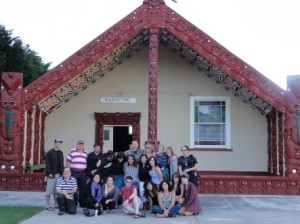
“Our communities, cultures, languages and social practices – all may be spaces of marginalization, but they have also become spaces of resistance and hope.” — Maori scholar Linda Tuhiwai Smith
The Native Decolonization in the Pacific Rim program on the Olympia campus in 2014-15 will focus on Pacific Northwest Native nations and Maori in Aotearoa (New Zealand), including a Study Abroad component for undergraduates in New Zealand (or elsewhere in the Pacific Rim) in February-April 2015. The three-quarter program will be taught by Native Programs faculty Kristina Ackley, Lara Evans, and Zoltan Grossman; Ackley and Grossman took the class to Aotearoa in 2011.
By concentrating on a larger region, students will have an opportunity to broaden Indigenous studies beyond the Lower 48 states, and explore and compare common processes of Native decolonization in different settler colonial societies. We will be studying decolonization through cultural revitalization and sovereign jurisdiction of First Nations. In order to examine the central role of Indigenous peoples in the region’s cultural and environmental survival, we will use the lenses of geography, history, art and literature.
In fall quarter, we will stress the complexities and intricacies of colonization and decolonization in Native nations of Washington and B.C. Students will gain skills to prepare for travel, and respectful interactions with Indigenous communities. We will expand the focus to appreciate Indigenous experiences in other areas of the Pacific Rim, emphasizing common concerns such as climate change, tourism, and cultural domination. For up to seven weeks in winter/spring quarters, most of us will travel to Aotearoa, where we will learn through participatory community projects how the Maori have been engaged in revitalizing their language, art, land, and politics, and their still unfolding, changing relationships with the Pakeha (non-Maori) people and society, while other students work with Indigenous communities elsewhere in the Pacific Rim.
For more information, see the report on the 2011 Study Abroad to New Zealand at http://academic.evergreen.edu/g/grossmaz/NZ.pdf and the 2014-15 program description at http://www.evergreen.edu/catalog/2014-15/programs/nativedecolonizationinthepacificrimfromthenorthwesttonewzealand-10764 Interested students (and Tribes wishing to fund their students) should contact ackelyk@evergreen.edu and grossmaz@evergreen.edu
John McCoy at Evergreen
JOHN R. McCoy, Democrat, represents the 38th Legislative District, which includes the Tulalip, Marysville and Everett communities of Snohomish County. John is Co-Chair of the National Conference of State Legislators Environment Committee and is an active member of the Environmental Management Roundtable, the Labor and Economic Development Committee, and the Communications, Financial Services & Interstate Commerce Committee for the National Conference of State Legislatures.
In the Washington State Legislature, John is Chair of Community Development and Housing and Tribal Affairs committee, Vice-Chair of the Environment Committee and sits on the House Education Committee. John has worked on expanding broadband across the state to get folks connected. He has also pushed to expand Washington’s renewable energy portfolio and create incentives for alternative energy, like biomass and solar. John continues to work on making Washington greener and run more efficiently.
John served in the United States Air Force for 20 years, retiring in 1981 with extensive training in computer operations and programming. He worked as a computer technician in the White House from 1982 to 1985. John went on to management in the private sector to continue his career in computer programming and operations. In 1994 he returned to Tulalip to help bring the community into the digital world and build what is now the Quil Ceda Village Business. In 2000 John became General Manager of the Quil Ceda Village Business Park where he retired August 2010.
He is encouraging Native youth to become active and aware in community building, education and leadership. Evergreen is honored to have John as a current member of the adjunct faculty in the Master of Public Administration, Tribal Governance program.
John and his wife, Jeannie McCoy, make their home in Tulalip. They have three daughters, nine grandchildren, and one great-grandson.
Lummi Victims of Crime Unit Recognized For Providing Outstanding Advocacy
MPA student and LVOC program coordinator and staff member, Nikki Finkbonner, received an award for outstanding commitment to eliminating domestic violence and sexual assault in the Native American community by Washington State Native American Coalition Against Domestic Violence and Sexual Assault in 2010-11. They were again recognized in 2013 by United States Attorney Jenny A. Durkan. The Lummi Victims of Crime Office provides comprehensive victim services including: domestic violence, sexual abuse/assault, teen dating violence, stalking, and emergency shelter. The Lummi Victims of Crime Department provides direct services including crisis counseling, follow-up contacts, therapy counseling, group treatment, legal assistance, personal advocacy, compensation claims, transportation, transitional housing, emergency shelter, and death notifications with Law Enforcement.
(The United States Attorney’s Office Western District of Washington June, 2013)
Sustainable Infrastructure at Evergreen and in Indian Country
With the opening of the new Evergreen Center for Sustainable Infrastructure, founded by Evergreen Alum and co-founder of Climate Solutions, Rhys Roth, a window has opened for sustainable growth research on Indian Country. Salmon recovery efforts by the Makah Tribe in the Hoko have been challenging, and two of the limiting factors that are readily recognized are water drawn from the river or tributary to the river and logging practices. The Clallam Bay Corrections Facility (CBCC) adds potential impact on the Hoko river watershed by its water use practices.
Micah McCarty, Special Assistant to the President for Tribal Government Relations, Office of the President, at The Evergreen State College saw a connection in the community. He wondered how the Center for Sustainable Infrastructure may help process current data on where CBCC is on the Sustainability in Prisons initiative and how that information could be used with what has been learned from Makah Fisheries on the annual trends of ” Instream Flow”, its’ effects on Hoko hatchery operations and potential solutions to reduce water usage from the Hoko. The use of student researchers through the MPA program and the Center for Sustainable Infrastructure, at Evergreen could propel project direction to better sustainability at the corrections center.
The project has gained support and attention both within the Washington Department of Corrections sustainability program and within the Makah Sustainable Resource commission.
Rita Andrews and Bobbie Bush, SPIPA employees and graduates from the Reservation Based Community Determined Program present at The Evergreen State College
The Reservation Based, Community Determined Program began in 1989 for place-bound students deeply connected to tribal communities. The program has been “reservation based” from the beginning with classes held on Indian reservations in western Washington. “Community determined” means that the program is initiated at the tribes’ request, that a tribal advisory board provides curricular direction, and that program content addresses significant community issues and utilizes community resources.
Students attend weekly classes at the reservation sites and also attend Saturday classes at the Longhouse where all students come together for classes, workshops and cultural events. Since 1989, hundreds of students have earned their degrees through the reservation-based programs and gone on to graduate school and various positions in tribal government, social services, education, and other fields.
Students with less than 90 college credits attend online classes designed for a high degree of cultural relevance, while enrolled as on-line students through agreements Evergreen has with two local community colleges. Students also attend class four Saturdays per quarter at the Longhouse on the Evergreen campus, with the Evergreen students. Students work toward a direct transfer Associate of Arts Degree.
For students who are at or close to 90 or more college credits, they can apply for admission to The Evergreen State College. Students attend class two nights a week at Muckleshoot, Nisqually, Peninsula, Port Gamble, Quinault and Tulalip. Students also attend class four Saturdays per quarter at the Longhouse on the Evergreen campus. Students work toward a Bachelor of Arts degree.
For more information on the RBCD program, call 360.867.6286 or visit the program’s website at www.evergreen.edu/tribal.
Rita Andrews and Bobbie Bush, SPIPA employees and graduates from the Reservation Based Community Determined Program present at The Evergreen State College
The Evergreen State College, Reservation-Based, Community-Determined Program offers a repeating three-year cycle of classes that have different themes, such as Native American leadership, ethics, critical thinking, federal Indian policy, sustainability, social justice, social services, governance and other topics of interest to contemporary Native peoples.
For Winter, 2014, the quarterly theme of the Reservation-Based, Community Determined Program is Building Healthy Communities, which is a nine-credit upper division course taught at The Evergreen State College and at six satellite sites, including the Muckleshoot, Nisqually, Port Gamble, Quinault, and Tulalip tribal reservations, plus the Peninsula College, which serves the various tribes on the Olympic Peninsula.
This interdisciplinary program uses a variety of methods, materials, and approaches to explore contemporary social problems and to build healthy tribal communities. Students examine the field of social problems and social policies in a wide range of areas. Students explore the values, vision and principles that guide efforts to identify and resolve social problems that challenge tribal communities, the process of building healthy communities, and change strategies such as community organizing and community empowerment.
Students learn from history while they investigate challenges currently facing urban and rural Tribal communities. Students come to understand how American Indian tribes retain sovereign powers of self-government over their internal affairs and over their self-reserved territories and natural resources in order to sustain their continued existence. The powers of tribal governments, particularly their jurisdiction over lands and natural resources, are often challenged by non-Indian interests, which can sometimes present obstacles to healthy community building.
The contemporary development of Native American political communities continues to be adversely affected by federal Indian public policy, jurisdictional conflicts in state-tribal relations, and “incorporation” conflicts with the U.S. political economy. The work for this quarter seeks to explore the political aspects of tribal sovereignty and the continued development of self-governance as the basis for tribal community building, self-determination, and building healthy communities in Indian Country.
Each quarter, our work together begins with hosting a panel of speakers who are specialists in their fields. This quarter, we began our work by hearing from Rita Andrews and Bobbie Bush, both of whom work at the South Puget Intertribal Planning Agency (SPIPA). Each of these two ladies have worked in many different programs throughout their lives that are aimed at building healthy communities in Indian Country. Their biographies are featured in a separate inset.
Bobbie Bush shared that she is the Colon Health Program Coordinator. The focus of this program is to increase the colorectal screening rate for all people age 50-plus with a goal of providing screening and follow-up to at least 800 eligible patients per year. This program also funds a half-time Patient Navigator at each of the seven participating tribes. Participating tribes include the Five Tribes (Chehalis, Nisqually, Shoalwater Bay, Skokomish, and Squaxin Island), plus the Quinault and Cowlitz. This program works closely with both Native Women’s Wellness and the Cancer Project.
Rita Andrews is the Native Women’s Wellness Coordinator. SPIPA’s Native Women’s Wellness Program (NWWP) has been funded by the Centers for Disease Control and Cervical Cancer Early Detection Program since 1994. Today, the program serves women of the Chehalis, Nisqually, Shoalwater Bay, Skokomish, Squaxin, and Quinault Tribes. The program works to reduce breast and cervical cancer mortality among the American Indian women of these six Tribes through culturally appropriate outreach, education, screening, and diagnostic services.
The program provides no-cost mammograms, clinical breast examinations, pelvic exams, and Pap tests to low-income, uninsured, and underinsured, primarily Native American women, living in the six tribal communities. It offers a variety of educational activities to promote early detection and treatment of both breast and cervical cancers. Education events include cultural, traditional and spiritual outreach.
Family, women doctors and clinicians, spiritual leaders, tribal clinics and familiar faces are important components in NWWP educational and awareness outreach. The NWWP partners with the Centers for Disease Control (CDC), Susan G. Komen for the Cure, American Cancer Society, Native People for Cancer Control, the Pride Foundation, Washington State Department of Health, Tribal National Cancer Programs, SPIPA Comprehensive Cancer Control Program, SPIPA Colon Health Program, SPIPA Tribal BEAR Project, as well as State, tribal and private task forces, and most importantly-the six Tribes participating in the Native Women’s Wellness Program.
Student Features from Reservation Based Community Determined (RBCD)
Larry Ralston: L to R- Celisha Ralston, Cecile ‘Charli’ Vargas-Ralston (RBCD, 2007), and Larry Ralston (RBCD, 2008)
Lawrence ‘Larry’ Ralston graduated from The Evergreen State College’s Reservation Based Community Determined (RBCD) in 2008. His parents are Earl Ralston, Sr. and the late Shirley Mae Ralston. Larry is an enrolled member of the Quinault Indian Nation and attended the RBCD program with his wife, Cecile ‘Charli’ Vargas-Ralston (Colville) and their daughter Maranda James (Quinault). Charli and Maranda graduated from the RBCD program in 2007.
Larry shared that “My wife and I were both college students earlier in our lives. One day, we looked at each other and decided that there no more excuses and we had to go back, as we were not getting any younger. The RBCD program suited our needs because the classes were held in the evenings and on weekends and we both worked. Since our daughter was still an infant, my wife started one year earlier than me. I stayed home with our daughter, Celisha Ralston, and on weekends I would drive to the campus and pick up my wife. Otherwise, the three of us could have graduated in the year 2007. But everything worked out okay; all three of us made it through the program and we all expect our children and grandchildren to be college graduates.”
Larry said, “It wasn’t easy at first because there had been a very long period since he’d had to ‘hit the books’ and study. Since my wife and daughter had a year’s head start on me, I was able to get on track quickly. The assignments seemed to revitalize what I had been taught while growing up, and the RBCD instructors were agreeable to me and the other students in the program. I was no longer being treated like a minority, and it was inspiring to be a part of a majority, for once. The books and curriculum taught me the truth about America and colonization. I was also challenged by our instructors to turn in my assignments on time and to participate in the classroom.
During my last year attending the program, we had to write a term paper. My instructor, Michelle Aguilar-Wells, told us our term paper had to be on something current. Since part of my ancestry is Quileute, I decided to write my term paper about the struggle that the Quileute were experiencing. The Quileute people live in LaPush, Washington, which is adjacent to the Pacific Ocean on the West and they are otherwise surrounded by Olympic National Park. The concerns I have for the Quileute people are many and I tried to capture as much as I possibly could in my term paper titled “Is Your Tribal Land Secure?”
I submitted my term paper in to our instructor, Michelle Aguilar-Wells, and waited until the following week to get it back. When my term paper was returned, I knew that I had messed up. I didn’t see any red ink anywhere, the assignment came back with no comments, and there were no strikeouts. Instead, there was a post-it note on the cover sheet that said, ‘I want to see you after class.’ My heart sank, as I knew my term paper was a complete flop. When class was over, I approached Michelle and said, ‘okay how bad was it.’ Michelle looked back at me, sort of startled, and said, ‘What?’ I looked at her again and said, how bad was my assignment? Michelle smiled and said, ‘there is nothing wrong with your assignment, we all loved it. In fact, we’ve decided to turn your term paper in to a case study.’ The next quarter, I met with Barbara Leigh Smith and with her expertise my term paper was turned in to a case study. Now, I’m told that my term paper/case study is still being used to this day, not only in the RBCD program, but in other institutions of higher learning.”
Larry said “I graduated from Evergreen in 2008. In March, 2009, I was voted in to tribal council for the Quinault Indian Nation. As a member of the tribal council, I’ve been assigned to complete tasks that require research, writing, and critical thinking. This is my fifth year on the council and at times, the tasks seem endless and nearly insurmountable. Dealing with tribal policies, state policies, and federal laws and regulations is very complicated. When I examine critical issues such as housing, jobs, sequestration, environmental laws, drug abuse and social interaction on a daily basis, I realize the importance of obtaining my education. While in the RBCD program, I learned that there are no shortcuts to success so students need to understand not to cut themselves short. My best piece of advice is to work harder, be the first one there, and the last to leave. And whatever you do, keep your family with you.
I am very thankful for the RBCD program, where we were all allowed to be ourselves. We have gained lifelong connections through obtaining our educations. I would like to thank my wife, my family, and the Quinault Indian Nation for supporting my education. Of course, our instructors were the best, especially Michelle Aguilar-Wells, Barbara Leigh Smith and Cindy Marchand-Cecil. Everything we did in our classrooms had value and meaning for me and I will never forget my lessons. But I would like to urge the current RBCD students to challenge yourselves every day you attend classes, to get your work in on time, and to participate in student governance. This is necessary because Indian Country needs you to be scholars of law, science, tribal councilmembers, certified public accountants, authors, reporters, health care providers and of course, professors. My wife, my daughter, and I miss the RBCD program and we wish everybody there nothing but the best, Siowkil.
Ricky Johnson
Ricky is a member of the Jamestown S’Klallam Tribe located in Sequim, Washington. He went to Sequim High School where he excelled at football, earning numerous state awards and scholarships for his athletics. His athletics helped him to develop discipline and accountability, which has driven his academic career.
After a brief hiatus from college, he earned his AA degree from Peninsula College at Port Angeles, Washington. He next enrolled at Washington State University where he attended for two semesters before being introduced to the Reservation-Based Program at The Evergreen State College. At that time, Peninsula College did not have a site, so his first quarter was completed through an independent study. For the next two quarters, Ricky drove to the Port Gamble site twice a week and in the fall of his second year, a site at Peninsula College was finally established.
During his time in the program, Ricky was blown away with the information, reading material and the overall way the program was run. His first quarter he said it reminded him of his first time snowboarding. He shares,
“My first time snowboarding I was taken up a double black diamond lift, the hardest part of the entire mountain. After what seemed like years on the frozen lift I was dropped off to a slope that looked as though it went vertically down the mountain. I thought to myself that there is absolutely no way that I am going to make it down the mountain alive and why wouldn’t they start me on the bunny slope? I had never done this before, did they want me to live? All around me where people leaping, sliding and bounding down the mountain making it look so easy! After calming my nerves I finally gathered myself and took the leap. My friends encouraged and supported me all the way down the mountain and I made it! That is also what the RBCD program was for me, exciting, new, vast, and fun. I made the leap into the program and although I had bumps, bruises and was sore even after that first run through the quarter, I succeeded because I had tremendous support from all the faculty at the RBCD Program. They wouldn’t let me start at the bunny hill. They weren’t going to accept anything but the best from me. I have and continue to be pushed and pushed and pushed some more to excel in everything I do. This program prepares you for your future, whether that is going to work or continuing your education this program is the step I am so glad I took.”
RBCD Program Director Cindy Marchand-Cecil shared that “Ricky has been one of our most outstanding students. From the start, he entered the program with exceptional research skills. He has worked hard on every assignment, and has a very strong interest in the intersection of nutrition as it relates to fitness. During his years in the program, he studied how mental health professionals can advocate for whole health by promoting diet, nutrition, and management of physical disease amongst American Indian clients. He reported out on recommended community strategies and measurements to prevent obesity, the relative contribution of dietary habits, physical activity, and body mass index as it relates to self-esteem amongst American Indian adolescents.
In some of his work, he studied the topic of living healthier for longer by examining the comparative effects of three heart-healthy behaviors on life expectancy with and without cardiovascular disease. He also studied the association of median household income with burden of coronary artery disease among individuals with diabetes, as well as the influence of age and family structure by race/ethnicity and place of residents.
In everything Ricky does, he incorporates information at the local and regional level, while considering the daily lives of the people in his community. He also has a strong interest in ethnobotany, and has written several papers and given many presentations on Native American use of plants as medicine, food, or tools. He gathered all natural Native foods, and served Crab Louie salad to everyone in class.”
Cindy added that “his academic efforts, as well as his strong leadership skills, helped to garner the attention of other students, who voted him in as Chair of the RBCD Student Governance committee. This committee is responsible for organizing the program graduation, and scheduling special events that happen in the program. Ricky is a highly capable person who helps to encourage others to be their best,” shared Cindy.
Ricky is just completing his final quarter of the Reservation Based Program and afterward plans to attend grad school at TESC. Teaching has been a lifelong goal for Ricky and he plans to use his education helping students realize their potential. In his spare time, people can often find Ricky playing with his young daughter, watching sports, or playing his guitar.
Kim Burdick
Kim is the daughter of Terry and Butch Tucker and Michael Chamberlain. She is mother to Aubrey Annie and Beau Burdick. Kim was born in Reno, Nevada, and has lived in Grays Harbor County for the past twenty years. She graduated from Ocosta Jr/Sr High School in 1997 with her high school diploma and also with her Associate of Arts Degree from Grays Harbor College through the Running Start Program.
Kim will graduate from The Evergreen State College, Reservation-Based Community Determined Program in June, 2014. She credits her mom and dad for always believing in who she is and what she can do. She thanks her Quinault site instructor and friend, Dorothy Flaherty, for encouraging her to keep going and for supporting her academic and personal growth. Kim’s children, Aubrey and Beau are her greatest inspirations. Her daughter, Aubrey, has already begun her Evergreen education as she likes to sit in during classes with Kim at the Longhouse and in Taholah each quarter. She is a “Greener” already, at nine years old!
While going to school, Kim is employed by The Confederated Tribes of the Chehalis Reservation as a Foster Family Recruiter and Licensor. Before starting her job at the Chehalis Tribe, Kim was employed by Quinault Indian Nation as their Domestic Violence Prevention Program Coordinator.
Kim started back to school in 2011 after going to work for Quinault Indian Nation. Debbie Martin, RBCD alumna and family friend, was instrumental in helping her to apply to the program.
When she finishes with her Bachelor degree at Evergreen, she plans to apply to the Master’s in Social Work program at the University of Washington. “My niche in this world is clear to me. I belong in areas where I can help children and families. It’s where I have found I fit and where I have discovered a happy me. I want my own children to have their opportunities to discover themselves.”
When asked what she looks forward to the most about graduating, she shared that “It’s the walk that I am looking most forward to and also having my children walk with me.”
Kim has been very involved and active in Student Governance, and has been the site representative for Quinault for two years, and a Student Governance officer. She has helped out with everything from purchasing tablecloths to helping to get the graduation speakers and entertainment scheduled.
Kim said that while enrolled in the Reservation-Based program, she learned how important school was when her daughter, Aubrey, started talking about becoming an archaeologist when she grew up. “We’re here learning to be what we want to be when we grow up. We get to grow up!” she exclaimed. Her daughter’s enthusiasm sold her.
The message that she would like to send to others about going to school is, “We are an example to someone in our life. Be the example that inspires that someone, no matter how young or old.”
Kris Peters
Hi, my name is Kris Peters and I am a senior at Evergreen. I am an enrolled Squaxin Island tribal member and I have worked in tribal government for 15 years. I live in Olympia with my beautiful wife Brandi and our two children Kody (10) and Shae (7). We love to camp, fish, and spend a great deal of time together on the water. We are also avid Seahawks fans!
I graduated from Capital high school in Olympia in 1995 and then graduated from Grays Harbor Community College with an Associate of Arts degree in 2012. I am now working on a Bachelors of Arts degree with the Reservation Based Community Determined Program (RBCDP) here at Evergreen. After I graduate from the RBCD program I plan on enrolling in TESC’s Masters in Public Administration in Tribal Governance.
Evergreen’s styles of learning both collaboratively and through interdisciplinary study have been very beneficial for me. The collaborative style of learning has shown me that we are a diverse people and we can learn so much from each other. I personally have learned a great deal from hearing other student’s perspectives during seminar. And the interdisciplinary study has helped peak my interest in different subjects while making myself a stronger, well-rounded student.
I have really enjoyed my time here at Evergreen. I look forward to receiving my diploma and continuing my postgraduate studies at The Evergreen State College.


